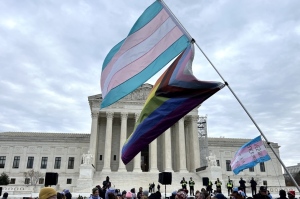The Battle for Equal Rights in the Arab World
The Taliban's recent shooting of a 15-year-old Pakistani girl for speaking out in favor of women's education is a stark reminder of the global plight of women. As the Arab Spring progresses, strong constitutional commitments to democracy and human rights are essential for the region to enjoy the peace and prosperity its people deserve.
Recent political developments in Egypt could hinder these efforts.
Since the fall of the Mubarak regime, Egypt has worked to create a new government, including new foundational documents. As the cultural heart of the Arab world and the largest Arab Muslim nation, this constitutional process could have profound regional impacts.
Unfortunately, there are some reports that suggest Egypt could pioneer efforts to permanently undermine the rights of women.
In early October, the Egyptian Constitutional Assembly released a new draft constitution. That draft calls for equality between the sexes so long as that equality is consistent with Islamic law.
In other words, there is a loophole that could be used to restrict the rights of women and appease radical clerics who see those rights as un-Islamic. Human Rights Watch says the draft constitution "falls far short of international law" regarding women's rights and religious and personal freedom.
Egypt is not alone. According to the United Nation's 2009 Arab Human Development Report, discrimination against women is "evident on the law books of several [Arab] states." In Saudi Arabia, for instance, women are not allowed to drive, are legally subservient to men, and must wear the full-covering abaya in public.
These restrictions are mild compared to the brutality of female genital mutilation and stoning, both of which are still practiced in some countries. According to the World Health Organization, 140 million women and girls have been subjected to genital mutilation. In the Middle East, it is practiced in Egypt, Iraqi Kurdistan, Jordan, Oman, the Palestinian territories, and Yemen.
Stonings for adultery have been recently reported in Afghanistan, Mali, Iran, Sudan, Saudi Arabia, Somalia, Pakistan, and the United Arab Emirates.
Religious and ethnic minorities also face harsh discrimination. Egypt's population is 10 percent Christian. And they're "deeply anxious about what the future holds for them and their country," according to Secretary of State Hillary Clinton.
A Christian pastor in Iran spent years under a death sentence for "apostasy" before finally being acquitted this year. Dozens of Iraqi teenage boys were stoned to death simply for sporting Western dress and haircuts.
These violations of basic human rights pose a danger to the gains made during the Arab Spring. In the long run, democracy and the rule of law offer Arab society a strong foundation upon which to a build a bright future that's still consistent with the desires of its people, culture, and history.
The Middle East will struggle to become stable and prosperous without societal reforms. I saw this first hand on a recent trip to the region as part of my work for the George W. Bush Institute's Women's Initiative.
Women's oppression keeps half of the Arab population from lending its full talents and efforts to solving society's problems. And this oppression fuels frustration that bubbles up in the streets in the form of protests.
Private efforts such as the Women's Initiative can play a significant role in promoting peace and stability in the region. But there is a role for the U.S. government as well.
By speaking out for the basic human rights, America can help cultivate peace and prosperity in the world. The U.S. government can serve our national security interests by supporting those who desire a brighter future for their countries but are being oppressed by their own leaders.
This support will give people yearning to be free a reason to join us in the fight against radical and extreme ideologies.
We must press for human rights to be protected in the constitutions of the Middle East and elsewhere. Even if these rights are not perfectly honored in the short-term, their inclusion in a nation's constitution gives future generations of reformers a powerful legal and rhetorical tool. Civil rights leaders here in America pointed to the constitution constantly in their battle for freedom.
Even in today's volatile environment, our influence in the Middle East remains strong. Each year, we give billions of dollars in foreign aid to this region. As freedom advocates build a new social foundation with new constitutions, the U.S. has a unique opportunity to ensure that that foundation is stable and capable of supporting a vibrant society by pressing for the protection of equal rights for women and religious minorities.





























